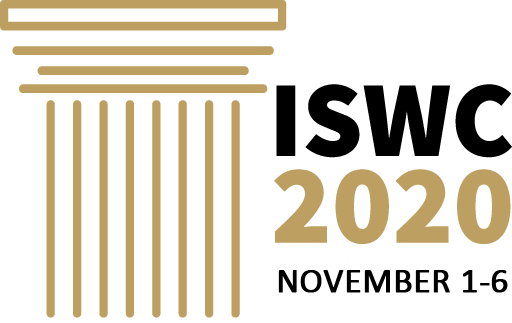A bustling and cosmopolitan metropolis, Athens is central to the economic, financial, industrial, political and cultural life in Greece. Located at the crossroads of three continents, the capital of Greece with an overall population of close to 5 million people has often been the melting pot of many cultures. Characterized by a culture and people that are welcoming, every visitor is sure receiving a warm welcome.
Athens is an ideal congress destination, combining state-of-the-art infrastructure, excellent congress facilities and easy access from all over the world with world-class cultural attractions, modern amenities, and diverse entertainment.
Past & Present
Boasting a history of 2.500 years with monuments incorporated into the modern city, coupled with world-class museums and a vibrant contemporary cultural life, Athens is a very attractive destination. The establishment of Athens as a city dates back to mythological times. Despite the length of the city’s history, it is still evident throughout Athens in the form of many ancient, Roman, Byzantine and Modern monuments.
A center for the arts, learning and philosophy, home of Plato’s Academy and Aristotle’s Lyceum, Athens was also the birthplace of Socrates, Pericles, Sophocles
The heritage of the classical era is still evident in the city, represented by a number of ancient monuments and works of art, the most famous of all being the Parthenon on the Acropolis, widely considered a key landmark of early Western civilization. The city also retains a vast variety of Roman and Byzantine monuments, as well as a smaller number of remaining Ottoman monuments projecting the city’s long history across the centuries.
Landmarks of the modern era are also present, dating back to 1830 (the establishment of the independent Greek state), and taking in the Greek Parliament (19th century) and the Athens Trilogy (Library, University, and Academy).
Athens was the host city of the first modern-day Olympic Games in 1896. Having hosted the 2004 Olympic Games, Athens can evidently meet the requirements of the most demanding of events, always delivering an impeccable result.
Today’s capital is a result of the integration of ancient and medieval history into the contemporary era.
Landmarks of Athens
Being one of the most historically significant cities in Europe Athens has much to offer to those who are interested in exploring some of the routes of our world’s civilization. Over the years, a multitude of conquerors occupied Athens and erected unique and truly splendid monuments. Today’s capital integrates ancient and medieval history into the contemporary era. Monuments can be found all around the city center, side by side with contemporary constructions such as buildings, roads, and train stations.
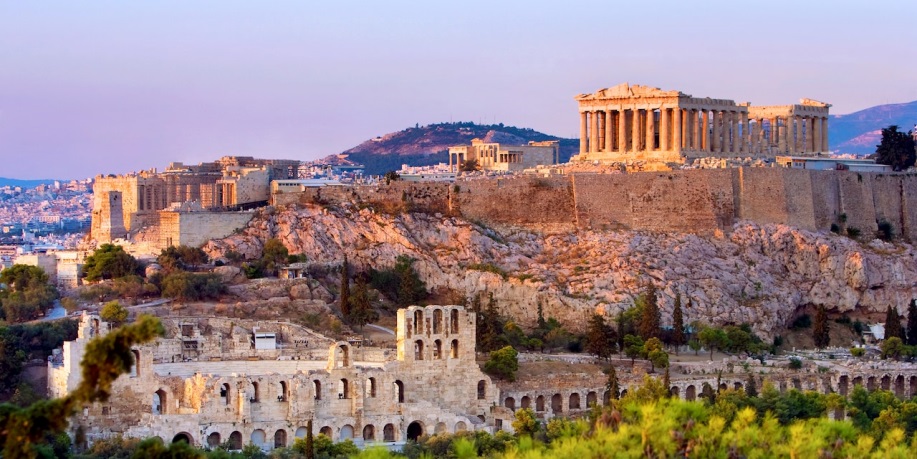
Acropolis
The Acropolis is the strongest and most important monument of Ancient Greek civilization. The main building, Parthenon was dedicated to Athena Parthenos, the patron Goddess of the city and was completed in 432 BC. Unique in its beauty, like all ancient monuments, it has suffered destruction and theft, but thankfully just under the hill where the monument stands in, there is the Acropolis Museum providing all the missing pieces of information needed for someone to understand its significance and all the stories it has played a role in throughout the years.
Hadrian’s Arch and the Temple of Olympian Zeus
Before starting the climb to get the Parthenon, it is impossible to miss a monument as impressive as Hadrian’s Arch. Constructed in 131 AD by the Roman Emperor, it was created to form an entrance for the new city and separate it from the old one. From the side of the monument that faces the Acropolis one can see the inscription “This is Athens, the former city of Theseus” while on the other side “This is the city of Hadrian and not of Theseus.
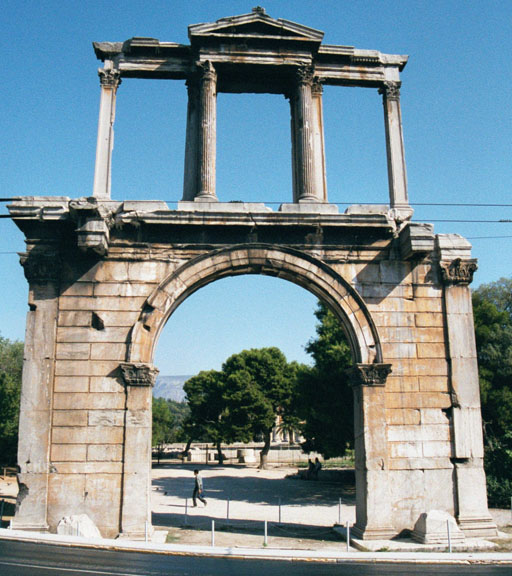
Behind Hadrian’s Arch, stands the captivating temple of Olympian Zeus. The building process started in the 6th century by Peisistratos and was finally finished 100 years later in 131 AD by Emperor Hadrian. Originally it consisted of 104 Corinthian columns of which only 15 remain standing today. Inside the temple, Hadrian built an enormous gold and ivory statue of Zeus and an equal one of himself. To this day we do not know when the temple was destroyed but like many other large buildings in Greece, it is possible that it was brought down by an earthquake during the medieval period and the ruins sold for other building materials.
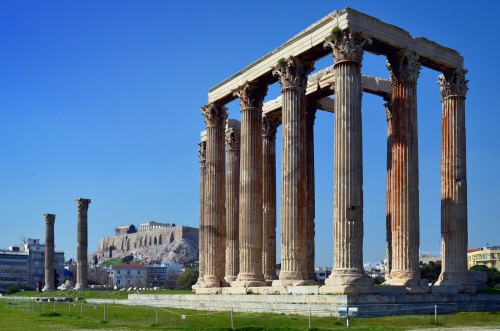
Ancient Agora
The Ancient Agora, which means “market” in modern Greek, is situated at the footsteps of the Acropolis and in ancient times it served as the commercial
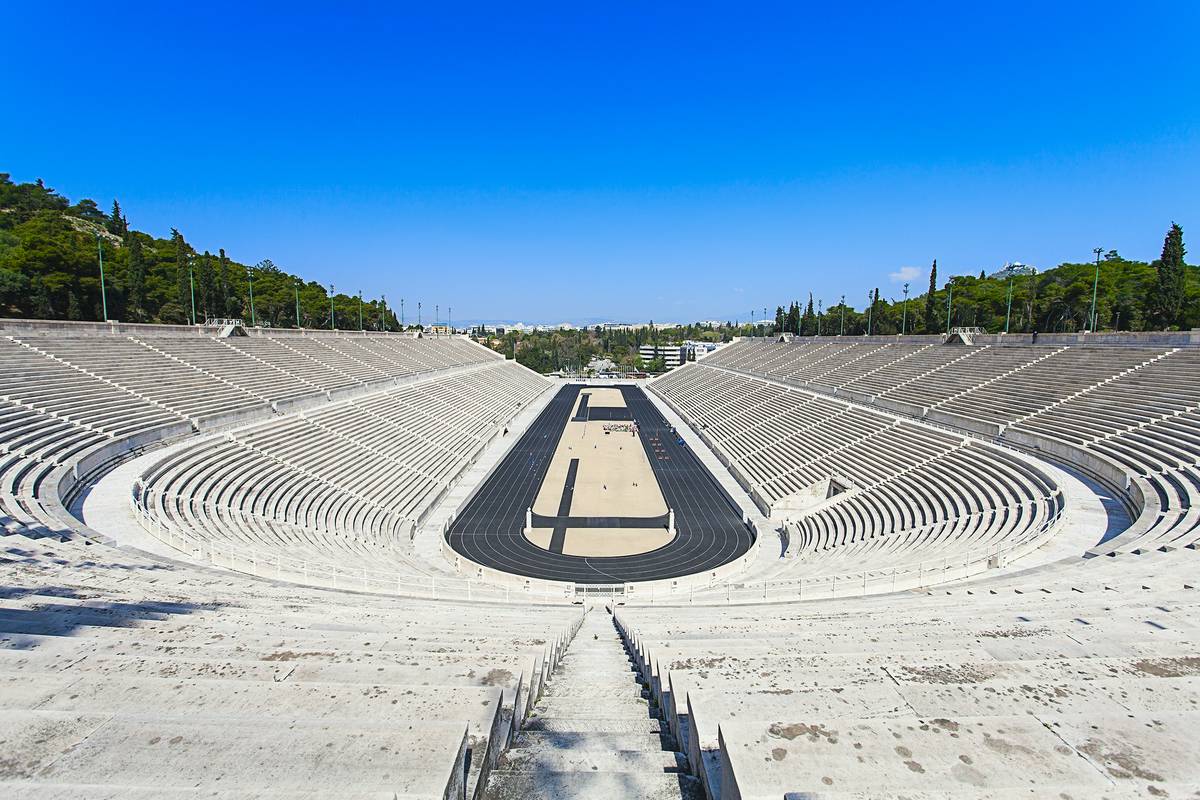
Panathenaic Stadium
Originally built in the 4th century B.C. for the athletic competitions of the Great Panathinaia (ancient Greek festivities), the “Kallimarmaron” Stadium was the venue of the first modern Olympic Games, in 1896.
Creation of the Athenians, as its name proudly proclaims, the Panathenaic Stadium has been the venue for noble competition and fair play, of mind and of body, since Antiquity.
Herodes Atticus Theatre
Built at the base of the Acropolis, the ancient
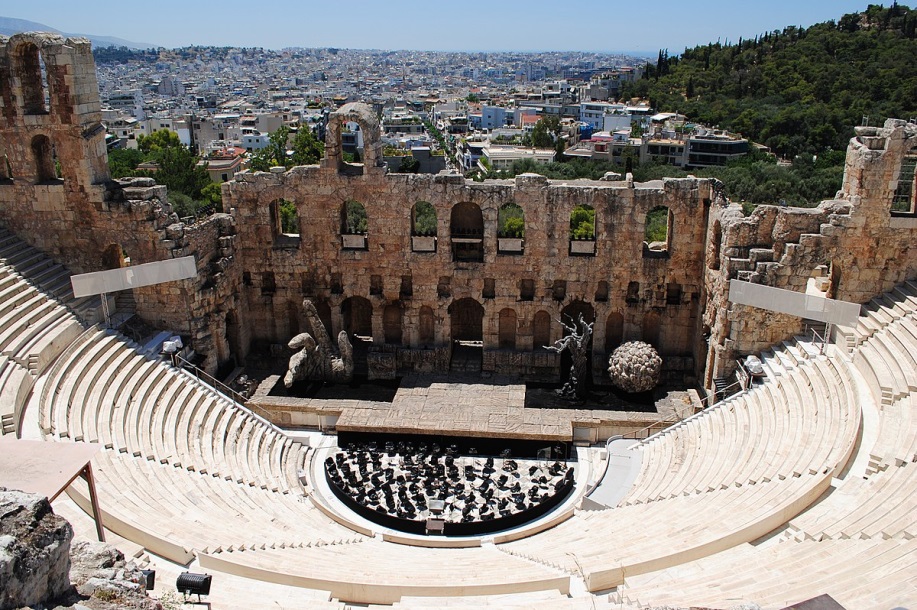
Museums of Athens
National Archaeological Museum of Athens
The National Archaeological Museum of Athens is the largest in Greece and one of the most important museums in the world devoted to ancient Greek art. It was founded at the end of the 19th century to house and protect antiquities from all over Greece, thus displaying their historical, cultural and artistic value.
http://www.namuseum.gr/wellcome-en.html
Byzantine & Christian Museum
The Byzantine and Christian Museum, which is based in Athens, is one of Greece’s national museums. Its areas of competency are centered on – but not limited to – religious artifacts of the Early Christian, Byzantine, Medieval, post-Byzantine and later periods. The Museum has over 25.000 artifacts in its possession, which date from between the 3rd and 20th Century A.D.
http://www.byzantinemuseum.gr/en/
Museum of Cycladic Art
The Museum of Cycladic Art is dedicated to the study and promotion of ancient cultures of the Aegean and Cyprus, with special emphasis on Cycladic Art of the 3rd millennium BC. It was founded in 1986, to house the collection of Nicholas and Dolly Goulandris, an extensive and unique private collection of prehistoric art from the Cycladic islands as well as ancient Greece.
https://www.cycladic.gr/
The Acropolis Museum
The Acropolis Museum was founded in 2003 and completed in 2007 after decades of being born as an idea, as a place that would accommodate the missing Parthenon sculptures. Today it is focused on the findings of the archaeological site of the Acropolis of Athens. The museum was built to house every artifact found on the rock and on the surrounding slopes, from the Greek Bronze Age to Roman and Byzantine Greece. It also lies over the ruins of a part of Roman and early Byzantine Athens.
http://www.theacropolismuseum.gr/en/
Benaki Museum
The Benaki Museum ranks among the major institutions that have enriched the material assets of the Greek state. It houses 30.000 items illustrating the character of the Greek world through a spectacular historical panorama covering several periods ranging from the Prehistoric, Ancient and Roman periods to the Byzantine and the contemporary Hellenic period.
http://www.benaki.gr/index.asp?lang=en
Hellenic Cosmos Cultural Center of the Foundation of Hellenic World
A living museum, an ultramodern cultural center, where visitors can learn about history, culture, and sciences through interactive exhibitions, educational programs, virtual reality shows, and documentaries.
http://www.fhw.gr/cosmos/index.php?&lg=_en
Shopping, Gastronomy & Nightlife
Shopping in Athens
One of the most popular places to go to in the center of the city is the Attica department store located in the center of Athens. One can find all kinds of products therefrom clothes, shoes, cosmetics, jewelry, bags, and even home equipment and decorating items. You name it, it has it. Around it, there are multiple coffee shops, theatres, and museums offering a full evening of satisfaction all in one area. On the north side of Attica is the Kolonaki area, the best place for high-end shopping in the city with all the big fashion names.
On the south side of Attica, is Ermou street. A road full of fun, fresh brands and shops leading to the ultimate street shopping experience of Monastiraki.
Plaka and Monastiraki are situated around the Acropolis and offer a unique experience combining walks through the old cobblestone roads and traditional flea markets and bazaars.
Greek Gastronomy
Greek gastronomy has recorded a history of around 4,000 years, with especial characteristics based on pure and unique quality goods produced on Greek soil. In fact, it was Archestratos who wrote the first cookbook in history (330 B.C.). In truth Greek cuisine has four secrets: good quality fresh ingredients, correct use of flavorings (herbs) and spices, the famous Greek olive oil, and simplicity.
Olive oil, honey, salt, and cheese may be the signature tastes one remembers after having a meal here but there are many more ways to impress your palette and satisfy your cravings. Due to the ever-generous Mediterranean sea, a Greek table is almost never complete without various delicious fresh fish.
Finally, when it comes to drinking, wine has been embedded in the Greek culture since the ancient times and is still taken and drunk very seriously by Greeks today as there are hundreds of wineries around the country and countless wine bars in all cities and islands. Other famous Greek drinks include Ouzo, Raki and the mysterious Mastic that can only be produced in one island in Greece as the plants of its origin are unable to grow successfully anywhere else in the entire world for reasons still unknown to this day.
Athens Nightlife, Cultural Life and Entertainment
One of the main characteristics of Greek Culture tourists notice is the vibrant lifestyle and unique hospitality of Athenians.
From jazz bars to pubs and the clubs to the traditional Greek Bouzoukia, Athens is a vibrant city offering a wide range of options that appeal to all sorts of lifestyles and tastes.
Dinner in Greece is served relatively late compared to other countries, reservations are rarely booked before 9 pm and bars never close before 2 am. Clubs in Athens can stay open until the morning hours making every night into a special occasion where one can meet new people, as Greeks have a tendency to meet, greet and include people when they are having fun.
As a night starter, Greece is one of the few countries in Europe where all cinemas play films in their original language with complimentary subtitles, therefore allowing our visitors to enjoy the pleasure of a movie the same way they would at home country.
General Information
Language
English is the ISWS 2019 official language. No simultaneous translation is provided.
Time
Athens is at UTC/GMT +3 hours during the summer period.
Electricity
The electrical power supply “voltage” in Athens is 220-240 Volts (U.S./Canada: 110-120 Volts).
Telecommunications
There are 4 main GSM operators in Greece that you can roam
Emergency Telephone Numbers
• Ambulance: 166
• Fire Department: 199
• Police: 100
• Tourist Police: 171
• General Telephone Information: 11888
Banking & Currency Exchange
Euro is the official currency. Banks’ working hours: Monday-Thursday from 8:00 AM – 2:30 PM and Friday from 8:00 AM – 2:00 PM.
Tipping
In restaurants and hotels, taxis or other services, tipping is optional and customized per case depending on whether you are pleased with the service. Approximately 5% of the bill is a good guideline.
Climate
Although the weather in Athens in November continues to get cooler, it is much warmer than most of northern Europe, making it an enjoyable place to visit this time of the year. The average temperature in November is 15°C (59°F), while the average low is 12°C (54°F), and the average high is 18°C (64°F). The beginning of November brings a mix of sunny and overcast days, with a slight chance…
Liability and Insurance
Registration fees do not include participants’ insurance against personal accidents, sickness, and cancellations by any party, theft, loss or damage to personal possessions. Participants are requested to make their own arrangements with respect to health and travel insurance. SWSA and the Organizing Secretariat PCO CONVIN accept no liability.
Call For Papers!
Click on the button to view the joint ISWC "Call for papers
